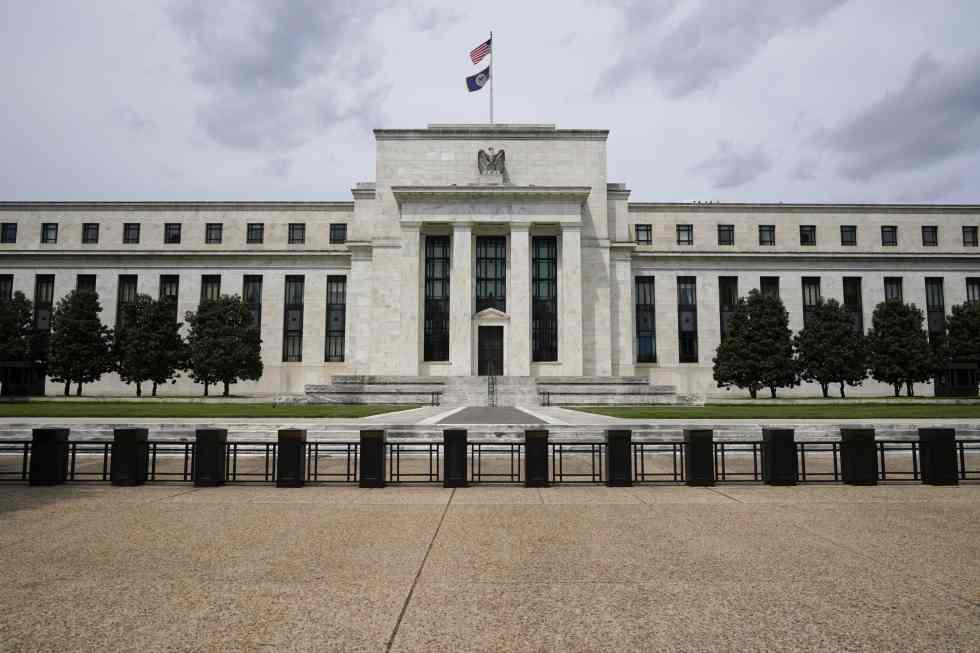The president of the Federal Reserve Financial institution of Boston is the most recent to name on the central financial institution to ease bond purchases because the financial system is bouncing again from the pandemic recession.
Eric Rosengren is one in all a rising variety of individuals inside and outdoors the Fed who stated the central again ought to scale back its monetary help. In an interview with the Related Press, Rosengren stated the central financial institution ought to announce it would start lowering its $120 billion in purchases of Treasury and mortgage bonds “this fall.”
The Fed applied the bond shopping for as a part of an effort to spice up the financial system through the COVID-19 pandemic, which formally began in March 2020, by providing decrease long-term rates of interest and to encourage borrowing and spending.
For extra reporting from the Related Press, see under.
Rosengren additionally echoed a number of the Fed’s current critics by arguing that the bond purchases are not serving to to create jobs however are as a substitute principally serving to drive up the costs of interest-rate delicate items comparable to houses and automobiles. Residence costs are rising on the quickest tempo in almost 20 years.
With inflation surging in current months, the Fed has come below criticism from Republican members of Congress for persevering with the bond purchases whereas additionally maintaining its benchmark short-term rate of interest pinned close to zero. Final week, a Democratic senator, Joe Manchin of West Virginia, echoed that concern, urging Chair Jerome Powellto begin tapering the bond buys.
Rosengren’s prompt timetable for tapering is quicker than most economists count on Powell to comply with based mostly on Powell’s current remarks that the job market wants to indicate additional enchancment. However like Rosengren, a lot of different Fed policymakers have expressed assist for a quicker discount in bond purchases. They embrace Christopher Waller, who serves on the Fed’s influential board in Washington, and James Bullard, president of the Federal Reserve Financial institution of St. Louis.
Different officers, although, have expressed a choice for a slower timetable, much like what Powell has prompt. Fed Governor Lael Brainard, for instance, stated late final month that she desires to see jobs and inflation information for the month of September to gauge how a lot progress the financial system has made. That information will not be accessible till October.
“There may be clearly a spot opening up on the Fed,” stated Neil Dutta, an economist at Renaissance Macro Analysis.
Vice Chair Richard Clarida stated final week that the financial system’s fast restoration would seemingly imply the Fed might begin lifting its benchmark rate of interest in early 2023. Dutta famous, nonetheless, that Clarida’s time period on the Fed’s board will finish in January.
Late final month, Powell stated at a information convention that Fed officers would talk about tapering its bond purchases at upcoming “conferences,” which would come with September, foreclosing the potential of an announcement that month, Dutta stated.
Fed officers have stated the financial system must make “substantial additional progress” towards its targets of most employment and annual inflation at modestly above 2 p.c earlier than the central financial institution will start to pare its bond purchases. Rosengren stated that he believed that this standards had already been met with inflation, which has surged above 2 p.c since this spring, and was near being fulfilled in regard to jobs.
In response to the Fed’s most well-liked measure, inflation reached 4 p.c in June in contrast with a yr in the past. Excluding unstable meals and vitality costs, it was 3.5 p.c, the quickest year-over-year progress since 1991.
“I might count on if we proceed to have [jobs] experiences like we have had over the past two, with very substantial payroll employment positive factors, that by the September assembly, we might, for my part, meet the substantial additional progress standards, and that might indicate beginning to taper someday this fall,” Rosengren stated.
The financial system added a sturdy 943,000 jobs in July, the federal government reported Friday, and the unemployment fee fell final month to five.4 p.c, from 5.9 p.c. That adopted a equally robust report for June.
Rosengren stated that whereas he agreed with Powell that present inflation ranges have been principally pushed by non permanent components associated to produce shortages, comparable to spikes in used automobile costs, different components comparable to rising wages have been more likely to persist and preserve inflation at the least barely above 2 p.c by subsequent yr.
“I welcome the truth that we’re seeing greater wages,” Rosengren stated. “That is good for larger financial equality….We do need to see sustained will increase in wages to guarantee that we have now sustained will increase in costs.”
Powell and another Fed officers, together with presidents Mary Daly of the San Francisco Fed and Neel Kashkari of the Minneapolis Fed, have stated they continue to be centered on making extra progress in lowering unemployment earlier than pulling again on the Fed’s stimulus efforts. Even after final week’s jobs report, the financial system nonetheless has 5.7 million fewer jobs than earlier than the pandemic.
But Rosengren prompt that the bond purchases, that are meant to spice up shopper and enterprise spending and spur demand for employees, are much less efficient when demand for labor is already robust and is being held again by disrupted provide chains. Most of the unemployed have considerations about contracting the virus at a job or have youngsters to take care of. Some have been receiving a soon-to-expire $300-a-week federal unemployment complement or have been holding out for greater pay.
“In the event you proceed to buy property, the response primarily is in pricing, not a lot in employment,” the Boston Fed president stated. “I do not assume asset purchases are having the specified impression on actually selling employment.”
Residence costs are hovering, but simply 8,300 jobs have been added in residential development final month, Rosengren famous. Fewer than 1,000 jobs have been added in auto manufacturing. Almost all of the 943,000 jobs added have been exterior these two interest-rate delicate sectors that Fed insurance policies are meant to bolster.











Leave a Reply